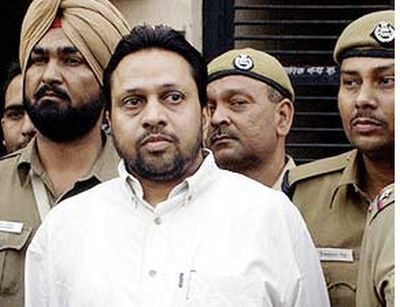 Former youth Congress leader Sushil Kumar Sharma, serving life term for the murder of his wife Naina Sahni in 1995, is to be released ‘forthwith’, the Delhi high court directed on Friday saying various positive recommendations underline his readiness to be integrated in the society.
Former youth Congress leader Sushil Kumar Sharma, serving life term for the murder of his wife Naina Sahni in 1995, is to be released ‘forthwith’, the Delhi high court directed on Friday saying various positive recommendations underline his readiness to be integrated in the society.
56-year-old Sharma has already undergone over two decades of incarceration in the 'Tandoor murder' case.
While allowing his plea for release from jail, a bench of Justices Siddharth Mridul and Sangita Dhingra Sehgal said: "It is incumbent upon us to observe that the recommendations of Social Welfare Department, probationary officer and prison authorities which clearly and unequivocally allure to reformation of Sharma have not been accorded due weightage in determining his representation.
"The positive recommendation underlines his readiness to be reintegrated in the society. It also records that Sharma is in semi open jail and participating in construction work."
Sharma had shot dead his wife in 1995, objecting to her alleged relationship with a male friend. He had then attempted to burn her body in a restaurant oven.
Tandoor murder case is one of the landmark cases in India in which DNA evidence and a second autopsy were used to establish the guilt of the accused.
The high court set aside and quashed recommendations of the sentence review board (SRB) which had rejected Sharma's representation for pre-mature release.
It also set aside the ‘non-speaking affirmation’ of SRB's recommendations by the Lieutenant Governor, who is the competent authority.
The board, which was constituted in 2004 as per Supreme Court directives and is chaired by the Delhi Home Minister, decides on the pleas of convicts and other related issues. The board also has representatives of Tihar Jail, Delhi Police and Home Department as its members.
It examines the records of those who have spent more than 14 years in jail and those who were given life term.
Advocate Amit Sahni, representing Sharma, had said that guidelines on premature release state that life convicts sentenced for a single offence are to be released after completion of 20 years of incarceration and those who had committed heinous crimes are to be granted the relief after 25 years.
The bench said the board cannot say that it is not bound by the guidelines, particularly, in view of the circumstances that it owes its very existence to them.
"SRB is bound by law to strictly adhere to the guidelines in the discharge of recommending function to review sentence of prisoner and refer them for release to the LG in appropriate cases," it said.
"There is no manner of doubt in our mind that the brief recommendation rejecting Sharma's representation suffers from vice of arbitrariness and illegality," the court held.
It added that to continue Sharma's incarceration, it was was incumbent upon the State to provide cogent and compelling reasons for his detention but they were absent here.
"Even after accepting the State's submission to the effect that the cap of 25 years in the guidelines do not warrant automatic release of a persons, we are of the view that Sharma's incarceration by the state does not admit of lawful sanction.
"In view of the foregoing discussion, we are of the view that SRB rejected Sharma's recommendation for pre-mature release arbitrarily and without due application of mind to the guidelines," the bench said.
The court said the incarceration of a convicted prisoner such as Sharma should not result in the suspension of all his fundamental rights and he should not be denuded of the rights enshrined in every person within the meaning of Article 21 (right to life and personal liberty) of the Constitution.
It said the issues in the matter are decided in favour of Sharma and against the state and said, "we accordingly direct that the state shall release Sushil Sharma forthwith. The writ petition is allowed."
In his petition, Sharma had said even though his case falls in the first category, he had also undergone 29 years of incarceration, with remission, and 23 years and six months, without remission.
Remission is part of sentence which is granted to an accused by accessing his behaviour and conduct during his stay in jail, on interim bail or parole or furlough. Remission is added to the sentence undergone by a prisoner in jail.
Sharma had also contended that his conduct in prison and while out on parole has been ‘exemplary’ and he has never misused his liberty.
Sharma, who is in prison since 1995, had contended that he has already undergone the maximum prescribed sentence as mandated under the SRB guidelines.
Delhi government standing counsel (criminal) Rahul Mehra had said the LG, who is the competent authority to decide the premature release of convicts, had accepted SRB recommendations not to release Sharma and all records were put before him.
Sharma was awarded capital punishment by a trial court in November 2003 and it was confirmed by the high court in February 2007.
He appealed against the verdict in the Supreme Court which commuted the death penalty to life imprisonment in October 2013.











 © 2025
© 2025